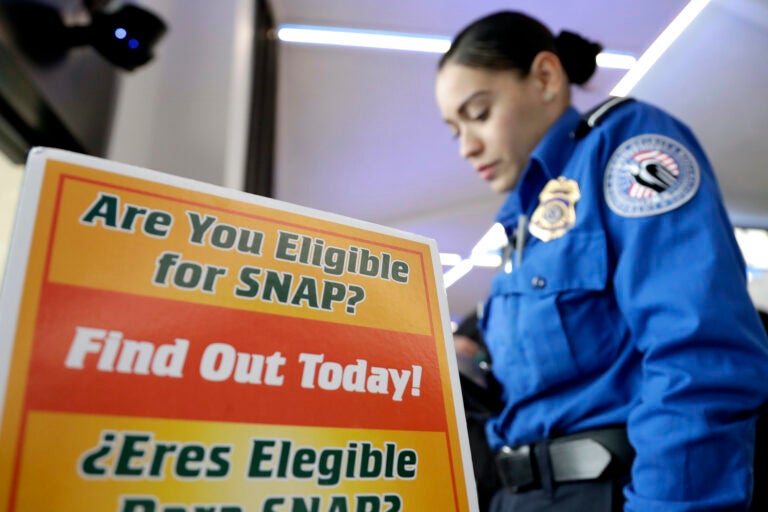Emergency funds help thousands of Delaware SNAP recipients
Thousands of Delawareans who receive help buying groceries from the state got extra funds this week as part of the state's ongoing pandemic response.

A Transportation Security Administration employee stands at a booth to learn about a food stamp program at a food drive at Newark Liberty International Airport to help government employees who are working without pay during the partial government shutdown, Wednesday, Jan. 23, 2019, in Newark, N.J. (AP Photo/Julio Cortez)
Ask us about COVID-19: What questions do you have about the current surge?
Congress may have stalled on approval of a second round of stimulus help for Americans struggling to make ends meet during the coronavirus pandemic, but SNAP recipients in Delaware have been able to get a little more money to buy food.
Delawareans who get SNAP (Supplemental Nutrition Assistance Program) benefits, often referred to as food stamps, got emergency funding this week as part of additional help offered to recipients each month since the pandemic started.
“In order to get resources to people who are the most vulnerable or the most in need, our federal partners and our state government have authorized us to provide emergency benefits for SNAP clients,” said Ray Fitzgerald, who leads the state Division of Social Services. “What the rules allow us to do is for families or individuals who don’t currently receive the maximum benefit in those programs, it allows us to now provide the maximum benefit to them.”
More than 35,000 households were eligible to get the extra benefits in November, totaling about $7.9 million.
“These folks that are able-bodied are predominantly the working poor,” Fitzgerald said. “Once you take away the children or the elderly or disabled folks away from the food stamp census, of the able-bodied adults who are receiving food stamps, 70 to 80% of them are working or have worked within the past 12 months.”
The emergency funds allow every SNAP recipient to receive the maximum benefit level, even if they earn too much money to normally qualify.
“Lack of food and financial resources is most keenly felt this time of year, so we are especially grateful for this ongoing assistance to Delawareans who are struggling as the pandemic continues,” said Department of Health and Social Services Secretary Molly Magarik. “With cases of COVID-19 rising in Delaware, our low-income residents need all the support they can get to stay healthy and safe.”
As of the end of October, more than 121,000 Delawareans were receiving SNAP benefits. Fitzgerald said new applications average between 4,000 to 5,000 every month.
As the number of COVID-19 cases continues to grow in Delaware, he’s expecting the number of new requests for help to increase as well.
“We do expect the volume to go up, and just like our staff managed before, we expect they’re going to be able to manage it again,” he said. “I’m more concerned with the mental strain on our staff personally having to deal with this crisis, both professional and personally, and not getting a break … that’s more my concern.”
The extra help was approved in March through the federal Families First Coronavirus Response Act. That legislation also included a temporary increase in federal payments to Medicaid for states and provided nearly a billion dollars in grants to states to cover unemployment insurance costs.

Get daily updates from WHYY News!
WHYY is your source for fact-based, in-depth journalism and information. As a nonprofit organization, we rely on financial support from readers like you. Please give today.




![CoronavirusPandemic_1024x512[1]](https://whyy.org/wp-content/uploads/2020/03/CoronavirusPandemic_1024x5121-300x150.jpg)


